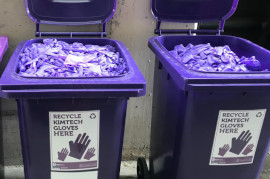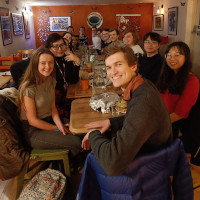
Please note that due to currently insurmountable logistical problems, the scheme described below has been temporarily suspended. If you are interested in sustainability in the department and the University, please consider joining the Chemistry Sustainability committee. Contact sustainability@ch.cam.ac.uk for more details and to join.
Forse group PhD student Chloe Balhatchet has launched a glove recycling scheme which will help decrease the department’s carbon footprint.
 The purple recycling bins are placed throughout the building.
The purple recycling bins are placed throughout the building.
Chloe overcame numerous obstacles to introduce the successful scheme to recycle Nitrile gloves, which are used in many of the department’s labs. According to Chloe, the University uses over four million nitrile gloves a year. "That's a wall of glove boxes bigger than King's College Chapel!" she says. Chloe says that gloves have previously been identified as the 6th largest research-related contributor to the University's waste.
To get started, Chloe followed up on rumours that in West Cambridge they were participating in glove recycling. After further investigation, Chloe realised the scheme could substantially reduce waste not only in the Forse lab, but throughout the department.
Although there have been some logistical difficulties, Chloe says: “On the positive side, 25 research groups in the department are now signed up for the scheme, and more have expressed an interest.” The teaching labs, analytical facilities and cleaning staff are also engaged with the scheme for their labs.
The Forse group has taken many further steps to discourage waste and reduce their environmental impact. Perhaps because their research involves finding, understanding and optimising materials that reduce greenhouse gas emissions or can be used in carbon capture, group members are even more aware of the importance of reducing their own carbon footprint.
Chloe, who is now in her second year, is using NMR to find and investigate new materials for supercapacitors. Supercapacitors are an energy store device with faster charging and discharging than batteries, making them suited to intermittent renewable energy storage and large electric vehicles, such as buses and trains. Others in the group also use them for carbon capture.
“One of the group’s core values is to be strongly committed to day-to-day improvements of sustainability in the group,” says Chloe. She notes that group leader Dr Alex Forse has been very supportive of these activities.
Probably most significantly, members of the group are strongly encouraged to use train travel rather than fly to conferences wherever possible, and Alex ensures they are supported in working away and that funding is available if needed. They are also trying to promote computational efficiency and adding stickers to fume hoods to remind researchers to save energy by closing the sash, as fumehoods use three times the energy of an average household each year.
Soon after Chloe started her PhD in the group last year, she became its first Sustainability Officer. Chloe is also one of the MCR Green Officers at Selwyn and has just become the Green Labs lead on the Cambridge Zero postgraduate steering committee, a role she hopes she can use to maximise the impact across the University of the work she has done here.
Chloe and her colleagues have developed a Sustainability Guide for the group which lists the 12 Principles of Green Chemistry. These principles include preventing waste of chemicals and resources, use of renewable feedstocks and reducing single-use items. The lab encourages group members to rinse and re-use glass vials and pipettes. Where items cannot be re-used to reduce waste, the next best efforts are in recycling responsibly.
 The group had their most recent Christmas gathering at Thrive, a plant-based café on Norfolk Street in Cambridge. From left: Chloe, Zugus, Emma, Niamh, Suzi, Shivani, James, Ben, Tristan, Sam, Grace, Jamie, Alex, Jack, Zhen, Xinyu, Zeke.
The group had their most recent Christmas gathering at Thrive, a plant-based café on Norfolk Street in Cambridge. From left: Chloe, Zugus, Emma, Niamh, Suzi, Shivani, James, Ben, Tristan, Sam, Grace, Jamie, Alex, Jack, Zhen, Xinyu, Zeke.
Even at social occasions efforts are made to minimise waste. “When we hold events we don’t use plastic cups – we host the event where we have access to dishes, or else someone brings reusable cups,” explains Chloe. Last year the group Christmas meal was at Stem & Glory, a vegan restaurant that provides carbon footprint information for all its dishes, and this year at local vegan café Thrive. Chloe says: “The best thing an individual can do to fight the climate and biodiversity crises is eat plant-based foods.”
Sustainability is also considered by choosing local events to minimise the impact of travel on the environment – in the last year these included a potluck in Darwin College, punting, walks, board games and a litter pick.
All group meetings have a Sustainability Minute, so there is always a chance to raise awareness of sustainability issues. “I feel this is really appropriate for our group, because our research involves climate change mitigation,” says Chloe. “And sometimes people forget to look at the wider things they can do rather than just in their research.”
Chloe tries to promote these steps in a very positive way and make it easier for people to follow sustainable practices. For example, she made the group sustainability guide and bakes plant-based cakes for group members’ birthdays. “Sometimes people take being ambitious about sustainability as criticism, but that’s not what I’m trying to do at all. I’m trying to promote it as positively as possible, but you can’t always get everyone on your side.”
And Chloe points out that efforts here in the Department have wider implications. "The impact of trialling the recycling of nitrile gloves and other sustainability initiatives in chemistry is not limited to their local effects in reducing waste," she says. "Since starting the glove recycling scheme, three other Cambridge departments and one chemistry department in another university have all been in touch with me."
If Chloe could make one recommendation for change in the department, she says: “If every group had sustainability as a regular agenda item, that would make a big difference. I would also like to see all research groups have a Sustainability Officer, so it becomes something in the department where we can all work together. Many people have contacted me with ideas but don’t know how to bring about the change – we’d have much more impact collaborating together.”
Lead photo shows (from left): Zugus, Zeke, Xinyu, Chloe, Shivani, Tristan, Alex and Emma at the litter pick.
